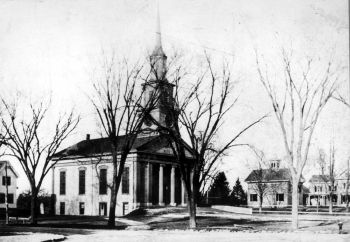The village of Stoughton, Massachusetts contributes many of its men as volunteers in the Union Army. So strong is sentiment for the Union that on April 22 at a town meeting, the community votes to make certain that the future needs of soldiers’ families are met:
That it is the sense of this meeting that we pledge ourselves as a town to see that all families of such persons as shall be accepted as volunteers in the present struggle to execute our National laws shall receive all proper support, and that a committee of two from each school district be appointed to see that all such families shall be supplied previous to Saturday next, and that they report at that time what measures are necessary to be taken for the future.
Shortly thereafter, Stoughton votes to “pay $12 a month to the wife of each married volunteer, and an additional $2 for each dependent child under age fifteen.” Should a soldier die during the war, the benefits would continue to his family throughout the war.
Yet not everyone in the village is enthusiastic about the war.
Today the North Bridgewater Gazette reports a mob attack upon the Baptist church. Vandals, in the form of a crowd of men and boys, attack the church and break numerous windows. The perpetrators, or at least like-minded folk, also torch the home of a black family. Presumably, the attack upon the church (and the property of the black family) is spearheaded by anti-abolition individuals who do not appreciate the abolitionist sentiments of the Baptists.
Like in other towns and villages in the North, many residents of Stoughton and surrounding villages at this time are committed to the preservation of the Union, but are not yet convinced that emancipation of African slaves is worth fighting for. Some fear free blacks would flood the labor market, creating more competition for jobs and forcing wages downward.
Many northern Protestant Christians, including Baptists, from the beginning of the Civil War interpret the conflict as an opportunity to eradicate the evil of slavery. For others, the abolishment of slavery as a war goal comes later. U.S. President Abraham Lincoln, recognizing the northern divide over the issue of slavery and himself committed to ending slavery, in the early months of war upholds the preservation of the Union as the goal of the war, only later focusing on emancipation in conjunction with shifting northern public opinion.
Source: “History of Avon,” Massachusetts (link)



